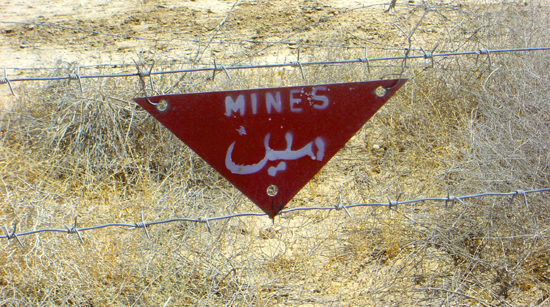
February-
March 2013
Stewardship for
a Lifetime
------------------
|

Ministry in the Minefield
by Terry Austin
Ministry in the military, like ministry anywhere, involves a complex network of systems and people. In order to be successful in our field of ministry, we must understand the culture around us if we hope to reach and understand its people. Successful ministry requires more than understanding the culture. We must do our part to make the culture better if we hope to be an effective witness for Christ. This is where individual gifts and talents come into play. God has entrusted each of us with a calling, and with that calling, He has provided the necessary tools and abilities to be successful in the field we serve.
After giving my life to Jesus Christ and answering the call to preach, I began to prepare my heart and mind for the pastorate. During that early part of my life, I only saw limited areas of ministry for a preacher—serving as a pastor of a local church or serving as an evangelist. I did not fully understand how God called “some to be apostles, some prophets, some evangelists, and some pastors and teachers” (Ephesians 4:11). I could not see myself fitting any other role in God’s service but pastor or evangelist. So, after fulfilling my initial military service obligation, I made the choice to attend Welch College.
While there, God worked through administrators, faculty, staff members, and Christian Service opportunities to open my eyes to many possible areas of ministry. I saw other committed Christians preparing and pursuing God’s will in various fields of service. They faithfully developed and used the gifts and talents they possessed. Obstacles in their paths turned into opportunities to grow, and academic challenges turned into a quest for knowledge. Those who did not give up became greater stewards of God’s blessings and candidates for even greater opportunities to accomplish God’s will in the field to which He called them.
For the last 22 years, the United States Army has been my field of ministry. It is the place where I believe God has called me, and He prepared and equipped me (and others like me) for the task. The chaplaincy was intimidating at first glance, but like Moses, Elijah, Paul, and John, God prepares individuals for what He has called them to do. Good stewards use the gifts God has given them to accomplish His will by lifting up Jesus Christ and seeking to be about our Father’s business (Luke 2:49).
When we understand our field of ministry, learn the culture to which we are called, and use our gifts to reach that field, we become effective stewards of God’s ministry. We can be sure we will make an impact, whether in the military, local church, or the workplace.
The Apostle Paul really understood ministry in difficult situations and learned to minister successfully in the most challenging fields. He once said he “became all things to all men” in order to reach them with the gospel of Christ
(1 Corinthians 9:22). While this did not mean Paul compromised who he was or what he believed, it does mean that he understood the challenges he faced in ministry and successfully honored the Lord in each situation. Like the Apostle Paul, we all face challenges in ministry. Embrace the challenges as an opportunity to use the gifts and talents God has given us to serve the field he has given us.
About the Writer: CH (COL) Terry W. Austin is IMCOM Command Chaplain at Fort Sam Houston, San Antonio, TX.
|
|

